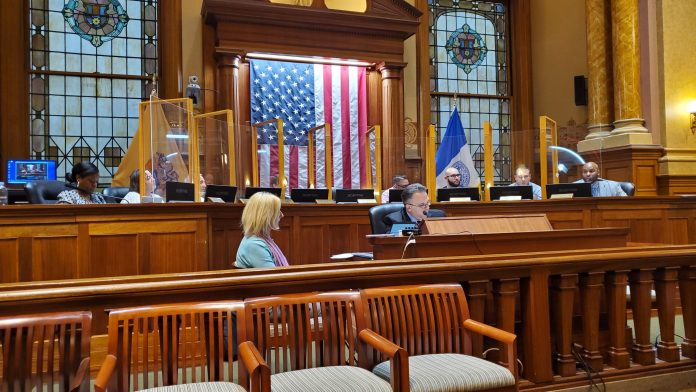The Jersey City Council approved a number of legislative items on Wednesday night, including changes for the Water Street Redevelopment Plan, and sending a request to the state treasury for a study on a local income tax for school funding.
The council also introduced regulations for cannabinoids and smoke shops, and steps to acquire property for two new police precincts.
Water Street Redevelopment Plan
The council unanimously adopted an amendment (with Council President Joyce Watterman absent from the meeting that night), to make changes to the Water Street Redevelopment Plan on the West Side.
The changes are in regards to a 621-unit mixed-use development at 100 Water Street. To facilitate the development of a new Route 440 boulevard, the floor area ratio requirements on Lots 4 and 5, located between Clark and Clairemont Ave., can be transferred over to Lots 1 and 2 that are between Ege and Clark Ave.. Additionally, Lot 2 will be allowed three additional floors for up to 15 stories to accommodate the floor area.
In exchange for the changes, the owners of Lots 4 and 5, WSI Developer, must demolish any existing structures on those lots, create public parking spaces alongside the eastern side of Water Street, install curbing, sidewalks and landscaping, and repave and restripe Water St.
Former Councilman Chris Gadsden, who used to represent the West Side-based Ward B that the development is in, had questioned the people behind the development, noting that Katerra, who had acquired Water Street’s developers, Fields Development, filed for bankruptcy last year.
He also said that there should be more affordable housing in the West Side. “Affordable housing [has] not been built (besides the project at 16 Bennett St.) in over decades,” he said. “We have to do a lot better.”
Jim McCann, who spoke on behalf of 100 Water Street LLC, said that he argued back at the caucus meeting that the inclusionary zoning ordinance wasn’t triggered because of the floor area transfer and they aren’t asking for additional floor area, to which Corporation Counsel Peter Baker backed up by saying it wouldn’t.
Councilwoman Mira Prinz-Arey, the current Ward B representative, said that affordable housing is being set aside for the Bayfront and University Place projects, and that none being built is “false.”
She also said that the development will add parking, storm flood mitigation, and lighting to make the area safer. “It’s not perfect, but it’s giving the residents something that they need,” she said.
Income tax study for school funding
The council then passed a resolution to ask the state Department of Treasury to conduct a study to see how much revenue from a local income tax would be generated to fund the city’s school district.
The resolution, which was sponsored by Councilman Frank Gilmore, would ask to see how a tax up to one percent could help the school district’s funding crisis after being subject to millions in state aid cuts since 2018.
The school district is expected to lose $68.5 million in state aid this year, and a preliminary $973 million budget that was approved last month had a $184 million shortfall and could cost property owners $1,611 per household over a year.
“Once we receive that information as a council, then we will be armed with directions we should go as it relates to a threshold or how are we gonna implement the tax and things like that,” said Gilmore.
While Gilmore acknowledged that the treasury could ignore their request and they might have to go through the State Legislature instead, he said that they have due diligence to take steps to take care of the city’s children.
Councilman James Solomon also said that the important part was to be proactive and converse on how to fund the school district that doesn’t completely fall on taxpayers. “It’s why we did the payroll tax back in 2018, but we know that [it’s] insufficient, given the extraordinary volume of cuts that are coming,” he said.
While the rest of the sitting council members were on board with the resolution, Councilman Yousef Saleh was the only one opposed, saying that they should look at other solutions such as cost saving measures and lobbying the state and federal Departments of Education to get federal pandemic funds.
The resolution passed 7-1, with Saleh being the only dissenting vote.
Other legislation
The council unanimously adopted a $131 million bond ordinance for a number of capital projects in the city. The bond ordinance needed six votes to be adopted, and would fund projects ranging from the Loew’s Theatre, parks and roadways and other infrastructure projects.
They also unanimously introduced a set of regulations for cannabinoids and smoke shops. The regulations would make it illegal to distribute cannabinoids to those under 21, and require all smoke and tobacco stores to register within 60 days of opening or qualifying as a store to register with the Department of Public Safety.
The council also introduced a combination of three ordinances that will allow the city to buy or condemn, through eminent domain, three properties for two new police precincts. The north precinct would be at 117 Hutton Street and 18 Sherman Place in the Heights, and the south precinct at 1 West Side Avenue.
All three of those ordinances were introduced 7-1, with Councilman Rich Boggiano, a former police veteran, being the only dissenting vote.
For updates on this and other stories, check hudsonreporter.com and follow us on Twitter @hudson_reporter. Mark Koosau can be reached at mkoosau@hudsonreporter.com or his Twitter @snivyTsutarja.






